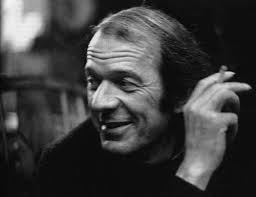Description
The Deleuze Seminars is a collection of audio recordings, transcriptions, and English translations of, and supplemental materials from, the lectures French philosopher Gilles Deleuze gave during his career at the University of Paris 8.
"Foucault" was a 25-lecture seminar given from October 1985 to May 1986. In these lectures, Deleuze offers his interpretation and analysis of French philosopher Michel Foucault's work. Examining the theoretical foundations and major themes of Foucault's philosophy, Deleuze dedicates several lectures to each of what he calls the "three axes" of Foucault's thought. This seminar coincides with the publication of Deleuze's book Foucault (1986).
The 22 April 1986 lecture marks the third part of the seminar in which Deleuze examines the third axis of Foucault’s thought. Deleuze begins by recapping: 1) the forms of exteriority and interiority in Foucault's The Archaeology of Knowledge; and 2) forces and the outside in Blanchot's The Infinite Conversation (with reference to pages 66 and 104). Other topics of discussion include: the line of the outside; the double death of the I (Je) and the One (On); psychoanalysis and what children say; psychoanalysis and the One (in this context, not the person of psychoanalysis); points of resistance and partial deaths; the "One dies" (on meurt) as a line of the outside; movement and the conversion of the distant to the near; Foucault's The Order of Things and how the inside is the double of the outside (with reference to page 350); Foucault's Madness and Civilization: A History of Insanity in the Age of Reason; the inside as the fold (pli) of the outside; Blanchot and thought as coming from the outside; Heidegger's What is Called Thinking?; French writer Antonin Artaud’s The Letters to Jacques Rivière and the vital “im-power” of thought; Raymond Roussel, the operation of the double and the doubling (doublure); and the invention of the fold by the Greeks.
This dataset includes: four mp3 recordings of the lecture (total time, 2:16:19), an aggregate version of the audio recordings into a single mp3, and the complete French transcription of the recorded lecture in both pdf (24 pp) and plain text.
-
Les Séminaires de Deleuze sont une collection d'enregistrements audio, de transcriptions et de traductions en anglais et de documents complémentaires des conférences que le philosophe français Gilles Deleuze a donné lors de sa carrière à l'Université de Paris 8.
«Foucault» était un séminaire de 25 conférences donné d'octobre 1985 à mai 1986. Dans ces conférences, Deleuze offre son interprétation et son analyse de l’œuvre du philosophe français Michel Foucault. En examinant les fondements théoriques et les thèmes majeurs de la philosophie de Foucault, Deleuze consacre plusieurs conférences à chacun de ce qu'il appelle les «trois axes» de la pensée de Foucault. Ce séminaire coïncide avec la publication du livre de Deleuze Foucault (1986).
La conférence du 22 avril 1986 marque la troisième partie du séminaire où Deleuze examine le troisième axe de la pensée de Foucault. Deleuze commence par récapituler: 1) les formes d'extériorité et d'intériorité dans Archéologie du savoir de Foucault; et 2) les forces et le Dehors dans L’entretien infini de Blanchot (p. 66 et 104). Les autres sujets de discussion comprennent: la ligne du Dehors; la double mort du Je et du On; la psychanalyse et ce que disent les enfants; la psychanalyse et le On (le On n’étant nullement la personne de la psychanalyse); points de résistance et morts partielles; le On meurt comme une ligne du Dehors; le mouvement et la conversion du lointain au proche; Les mots et les choses de Foucault et comment la ligne du Dehors est dedans (p. 350); Folie et Déraison: Histoire de la folie à l'âge classique de Foucault; le dedans comme le pli du Dehors; Blanchot et la pensée venant du Dehors; Qu'appelle-t-on penser? de Heidegger; Les lettres à Jacques Rivière de l'écrivain français Antonin Artaud, et l'im-pouvoir vital de la pensée; Raymond Roussel, l'opération du double et de la doublure; et l'invention du pli par les Grecs.
Cite this work
Researchers should cite this work as follows:
- Gilles Deleuze (2017). Foucault: Lecture 20, 22 April 1986. Purdue University Research Repository. doi:10.4231/R7348HJC
Tags
Notes
This research has been generously supported through a grant from the College of Liberal Arts, Purdue University.
The translations of Deleuze’s “Foucault” seminars have been made possible by a Scholarly Editions and Translations grant from the National Endowment for the Humanities. This research has also been generously supported through a grant from the College of Liberal Arts, Purdue University.
The description of this dataset is based on the meticulous work of Frédéric Astier, whose Les cours enregistrés de Gilles Deleuze, 1979-1987 has catalogued Deleuze’s seminars for those years.
Special thanks to the family of Gilles Deleuze and the University of Paris 8 for permission to reproduce the material published here.
The Deleuze Seminars
This publication belongs to the The Deleuze Seminars group.

